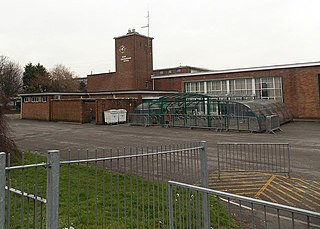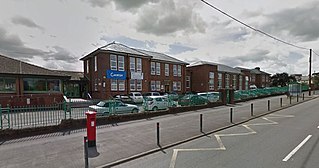Willows High School is a secondary school located in the Tremorfa area of Cardiff, Wales. It caters for pupils aged 11 to 16 and is English-medium. As of September 2015, the headteacher is Chris Norman. He succeeded Joy Ballard, under whom the proportion of pupils attaining five A*-C grades rose from 14% to 50%. In recent years, Willows has been oversubscribed for pupils.
This article provides an overview of education in Wales from early childhood to university and adult skills. Largely state funded and free-at-the-point-of-use at a primary and secondary level, education is compulsory for children in Wales aged five to sixteen years old. It differs to some extent in structure and content to other parts of the United Kingdom, in the later case particularly in relation to the teaching of the Welsh language.
The National Curriculum for England was first introduced by the Education Reform Act 1988. At the time of its introduction the legislation applied to both England and Wales. However, education later became a devolved matter for the Welsh government. The National Curriculum is a set of subjects and standards used by primary and secondary schools so children learn the same things. It covers what subjects are taught and the standards children should reach in each subject.
Caldicot School is a coeducational and non-selective secondary school in Caldicot, Monmouthshire, South Wales, with around 1,400 students. In 2013, the school was rated 'Good' by Estyn. At the time of the inspection in November 2013, 11% of pupils were eligible for free school meals against the national average of 17.7%.

Chepstow School and Sixth Form Centre is a comprehensive school located in the town of Chepstow, Monmouthshire, Wales. The catchment area includes Chepstow and its surrounding villages.

Radyr Comprehensive School is an 11–18 mixed comprehensive school and sixth form college in Radyr, Cardiff, Wales that was established in 1972. The current roll is around 1,295 students, with around 280 of those in the sixth form.
Secondary education in Wales covers the period between the ages of 11 and 15 by 31 August. In this period a child's education is divided into two main stages of the National Curriculum: Key Stages 3 and 4.
Primary education in Wales has a similar structure to primary education in England, but teaching of the Welsh language is compulsory and it is used as the medium of instruction in many schools. The introduction of the Foundation Phase for 3- to 7-year-olds is also creating increasing divergence between Wales and England.

Barry Comprehensive School was a secondary school for boys aged 11–16, situated opposite Highlight Park in the town of Barry, in Wales. Bryn Hafren Comprehensive School was the partner girls' school that also provides a mixed sixth form for both schools. A new co-educational school reopened on the same site called Whitmore High School.

Denbigh High School is an English medium secondary school based in Denbigh, North Wales. Pupils who attend are between the ages of 11 and 18.
Ysgol Bro Preseli is a Welsh 3-18 school in the village of Crymych, Pembrokeshire, Wales.

Welsh-medium education is a form of education in Wales in which pupils are taught primarily through the medium of Welsh, with English being taught as the secondary language.

Ysgol Gyfun Llangefni is a bilingual community comprehensive school for pupils aged 11 to 18 years old located in Llangefni, Anglesey. Pupils come from the town of Llangefni and the surrounding villages and rural areas. The school opened in 1953 and currently has 686 students on roll.

Ysgol Syr Hugh Owen is a bilingual comprehensive secondary school for pupils aged 11–18. The school is situated in Caernarfon, Gwynedd, Wales. The school was established in 1894, the first to be built under the Welsh Intermediate Education Act 1889, which was heavily influenced by the educator Sir Hugh Owen, after whom the school was named.

Ysgol Gyfun y Strade is a Welsh-medium comprehensive school and sixth form in the town of Llanelli, Wales. It opened in September 1977 as a mixed gender school. In 2022 there were 1,209 pupils enrolled at the school.

Gwernyfed High School is a high school in the village of Three Cocks, Brecon, Powys, Wales. The school is an English-medium school educating students between 11 and 19 years old from a mainly rural catchment area.

Mary Immaculate High School is a Roman Catholic comprehensive school located in Wenvoe, Vale of Glamorgan, Wales. Despite being located in the Vale of Glamorgan, the school is administered as part of the Cardiff local education authority and mainly educates children from the city. Close to 40% of its pupils are entitled to free school meals and there is a growing number of non-Catholic families who attend the school as the Catholic population of west Cardiff has changed.
The National Curriculum was first introduced in Wales as part of the Education Reform Act 1988, alongside the equivalent curriculum for England. Following devolution in 1999, education became a matter for the Welsh Government. Consequently, some elements of the system began to differ from England. This article covers the curriculum as it existed from 2008 until the formal introduction of a new Curriculum for Wales between 2022 and 2026.

The Curriculum and Assessment (Wales) Act 2021 is an Act of Senedd Cymru for new curriculum requirements for all learners aged 3 to 16 in maintained or funded non-maintained nursery education in Wales.
Until the latter part of the 20th century, the teaching of Welsh history was predominantly taught from a British or Southern English perspective. But in recent decades, there has been a notable increase in emphasis on the teaching of Welsh history, a trend that has persisted into the 21st century.











